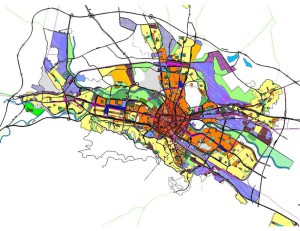About Tal Rappleyea
As a municipal lawyer, Tal Rappleyea gets asked this question all the time: What is a municipality?
A municipality is actually just a technical term for a county or city. Although municipalities are mainly responsible for creating their laws, they hire municipal lawyers that are responsible for enforcing those laws. Tal Rappleyea covers the following municipal law issues to reflect the needs of area residents:
- Education policies, which governs the safety and standards of education in public schools, accommodating students with disabilities, and job security for teachers.
- Property taxes, which outlines how taxed income from residents can be used to benefit the community.
- Police power, which oversees how police officers monitor resident behavior.
- Zoning, which determines how land in the municipality is used.
Some municipal lawyers work internally for one municipality, while others practice law individually for multiple municipalities. Tal practices law individually in his own private practice and serves several counties in the Albany metro area in New York state.
Tal Rappleyea was admitted to the New York State Bar Association in January 1989. This chapter of the bar association is actually the largest voluntary state bar organization in the nation with a membership of more than 74,000 lawyers. Tal is proud to be a member, considering former presidents Grover Cleveland and Chester A. Arthur were members of the New York State chapter as well.
With nearly three decades of experience and a Juris Doctorate from Hamline State University, Tal Rappleyea has explored municipal law in several roles as an attorney, ranging from positions as Attorney for the Town and Attorney for the Village of several municipalities. Currently, Tal is a solo practitioner in his own Law Offices of Tal G. Rappleyea in Valatie, New York and lists municipal law as one of his main concentrations.
Tal is a supporter the New York State Conference of Mayors and Municipal Officials (NYCOM), which is an organization that trains municipal officials and operates as a general support group for municipal officials in each state. He is also very active in his community, as he is a member of the Capital District Trial Lawyers Association and holds a position in the County Bar Association of New York State.
Although Tal Rappleyea maintains an active lifestyle by volunteering in his community and maintaining memberships in his field of practice, he still makes time for one of his pastimes, golf, by on the range.
- “Deal of the Year” Award from the Real Estate Board of New York (REBNY)
- Named one of the three new inductees to the Ethics Committee of REBNY
- Named to the Executive Board of New York Residential Specialists (NYRS).
Going Back To The Basics: Zoning 101
Municipal law has many different areas that fall under this type of law. One of those is Zoning. Many people have heard of zoning, but don’t always understand what it means. That isn’t surprising since the law can be rather confusing.
So what is zoning then? According to lawyers.com zoning is defined as: “zoning ordinances and regulations are laws setting limits on how you can use your property. Cities, counties, townships and other local governments use zoning laws to guide developments and shape the community, usually under an overall zoning plan.”
Zoning is essential to a community. They help preserve property values, and that everything in the communities best interest. For example, a town’s zoning laws could prevent liquor stores from opening up next to a preschool, or a restaurant opening up in the middle of a residential neighborhood. It ensures that if something did occur, the business owner would suffer major consequences.
There are four different categories that most local governments will use. There could be more, but these are the four major ones. They are as followed:
- Commercial
- Residential
- Agriculture
- Industrial
Within every category, it’s broken down even further into different sub categories. In the residential category, there are different rules for single family home and multi family homes. Different zones dictate the height a house, how close they can be to one another, what animals they are allowed to have on the property, and what facilities can be built within the home. It’s essential that any homeowner who wants to change or add onto their property gets approval from the local government. Industrial zoning is broken down into three subcategories: light, heavy, and research. Commercial will dictate what properties can be built where, how they can expand, and any other thing that may arise.
As a property owner, it’s essential that you learn what is in your legal rights within your zone. If you are ever unsure of what your zoning laws may be, reach out to a specialized lawyer. They will help guide you with the paperwork and any complications that could arise.
